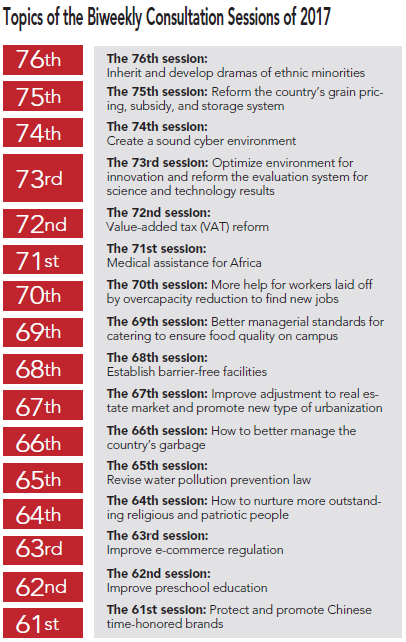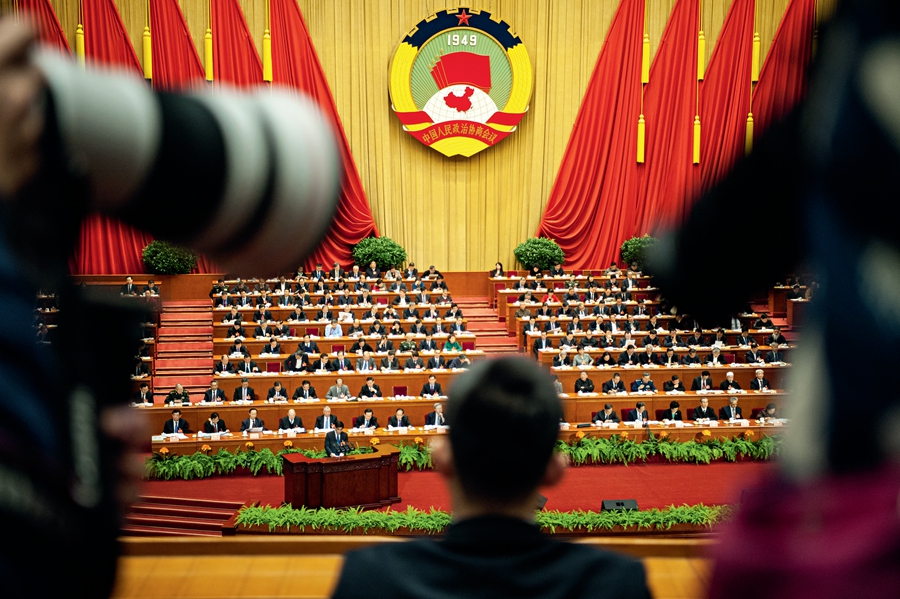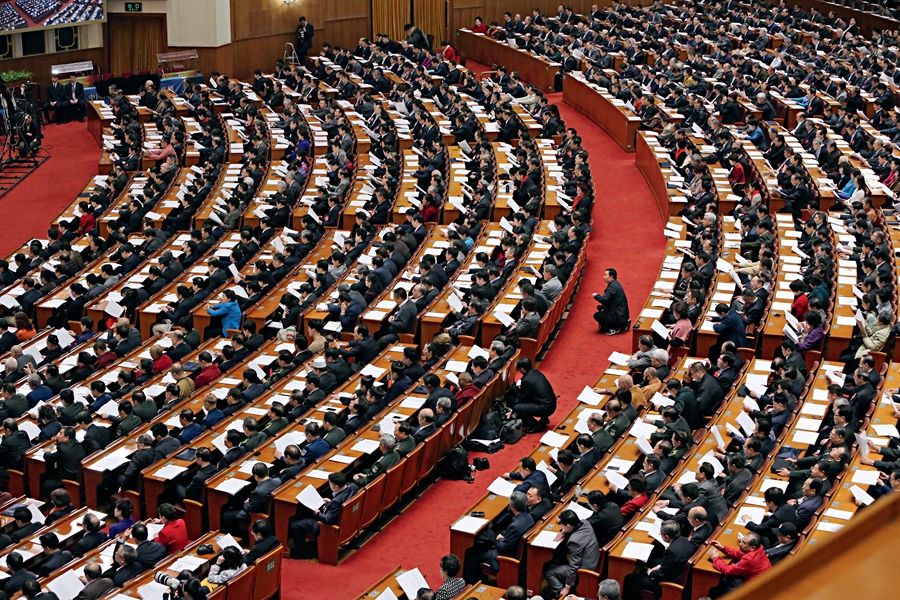By staff reporter HOU RUILI
THE Chinese People’s Political Consultative Conference (CPPCC) is an important institution for developing multi-party cooperation and political consultation under the leadership of the Communist Party of China (CPC). It allows the decision-makers to hear the will of the people; therefore, it serves as a key platform to promote consultative democracy in China. The CPPCC consists of representatives who are high-end talents selected from different parties and fields. They are professionals and enjoy certain social influence. The CPPCC adopts a biweekly consultation session, inviting CPPCC members, experts and representatives of different industries, and government officials to have in-depth and heated discussion about various issues based on investigation. Their suggestions are submitted to decision-making organs.
Making Consultative Democracy an Institution
Such biweekly consultation sessions existed in the initial period of the People’s Republic of China. In the 1950 to 1966 time span, altogether 114 such sessions were held, facilitating key decision-making and multi-party cooperation. The sessions were suspended during the “cultural revolution” (1966-1976).
CPPCC members attend the second plenary meeting of the Fifth Session of the 12th CPPCC National Committee in Beijing on March 9, 2017.
In 2013, the biweekly consultation session was restored. President Xi Jinping pointed out that the CPPCC’s political consultation should be included as an important link in the decision-making process. The government should work with the CPPCC to make annual work plans. Xi noted that, “On issues which demand democratic consultation, we must carry out consultation before or in the middle of decision-making. The collected suggestions and ideas should be considered when making decisions and adjust our work. An institution should be established to guarantee the implementation of democratic consultation results, so that the decisions we make and the work we have done are in accordance with the will of the people and can better meet practical conditions.” Since the first biweekly consultation session was held in October 2013, there have been 76 such sessions convened by the end of 2017.
Free Discussion
The 76th biweekly consultation session convened on December 7, 2017 was themed on how to inherit and develop dramas based on ethnic minorities. Yu Zhengsheng, chairman of the National Committee of the CPPCC, 14 CPPCC members, two scholars, and government officials from departments such as the Ministry of Culture, the State Ethnic Affairs Commission, the CPC Publicity Department, the Ministry of Finance, the State Administration of Press, Publication, Radio, Film and Television sat around a table and exchanged thoughts and ideas with each other. In fact, before the meeting, some attendees had conducted investigations to understand the conditions in Inner Mongolia, Qinghai, Guangxi, and Guizhou.
The 76-year-old Tan Zhixiang, honorary chairman of China’s Society of Dramas of Ethnic Minorities, was invited to participate in the investigation in Qinghai. Tan found shortage of headcount and lack of funds has been the biggest obstacle for the development of Qinghai’s Tibetan Opera Troupe. In fact, it has been a common obstacle for many troupes of dramas of ethnic minorities.
The CPPCC’s political consultation is included as an important link in the decision-making process. Yu Jie
Are dramas of ethnic minorities really lackluster without appeal to audience? Tan shared a story on the meeting. “The Dai people like watching Dai Opera. Once the Dai Opera Troupe of Dehong Dai and Jingpo Autonomous Prefecture staged a performance in the border area between China and Myanmar, while a movie was also displayed nearby, but more audience preferred the Dai Opera rather than the movie,” Tan said.
Targeting the problems in inheriting and developing dramas of ethnic minorities, the participants held detailed and frank discussions with government officials and they reached consensus on solutions, which include: making targeted measures and policies to boost development of dramas of ethnic minorities, increasing government support, encouraging the development of dramas that are more popular at the grassroots, introducing targeted measures to facilitate talent cultivation and encourage innovation, and creating a favorable environment for the development of amateur troupes.
The biweekly consultation session advocates free discussion and exchange of ideas. According to the News Bureau of the General Office of the CPPCC National Committee, participants debated on if we can develop nuclear energy at the session which focused on “nuclear power and clean energy development.” The two sides had a heated exchange of opinions. A series of valuable suggestions were put forward through discussions and reported to the central government. The open and free discussions allow the confrontation and clashes of various ideas and thoughts, promoting consensus between different interests groups, and breakthroughs to be made in carrying out reforms.
Yu Zhengsheng once said that the biggest characteristic of such sessions is consultation, which means reaching consensus through sincere discussion and free expression of differing ideas.
Each session invites about 20 members to participate in the discussion on relevant topics. The CPPCC members serve a term of five years. So in one term, over two-thirds of members are able to participate in the consultation sessions. Each member connects with a certain industry or represents a group of people, so their ideas represent the will of the people. The session serves as a good platform for citizens to orderly participate in political activities.
Besides the CPPCC members, the session also invites experts, making the discussion professional. For example, on the session of “utilization of big data to help improve the governance of government,” Jack Ma, founder and chairman of China’s e-commerce giant Alibaba, was invited to contribute his ideas and solutions.
Think “Big Picture” from Small Topics
The sessions usually focus on urgent issues facing China’s development that need to be addressed. The participants usually start from small problems and expand to the bigger picture through discussions, with an aim to find out effective solutions. Most topics are set in the beginning of a year and approved by the Standing Committee of the Political Bureau of the CPC Central Committee. Every topic is closely related to the final decision-making. In December 2014 when the session on how to better protect traditional villages in the process of urbanization was held, the guiding opinions concerning enhancing the protection of Chinese traditional villages had been introduced for eight months; however, problems such as the lack of funds and development models, and unplanned development that caused damage to natural environment, still existed. In May 2014, the session on problems that needed to be focused and solved while cutting excess capacity was held. Although the guiding opinions on how to resolve the conflicts when reducing industrial overcapacity have been released by the State Council, and certain achievements have been made in this regard, we still face many arduous tasks. Suggestions and ideas formed on those sessions are conducive to solving those problems.

Along with social development, the topics of the sessions have evolved from economic development, environmental protection, and guarantee of rights and interests to cultural development, innovation, and people’s livelihood issues.
Facilitating Decision-making
Three days after each session, the General Office of the CPPCC National Committee will collect all the ideas and suggestions and report them to state leaders and relevant central governmental departments for them to refer to when making decisions or improving the policies.
In December 2013, the session on problems related to automobile exhaust fumes was held and a report was made based on the discussion and delivered to the central government. Premier Li Keqiang noticed that the “yellow-label cars,” which refer to vehicles failing to meet national emission standards, account for only 13.4 percent of total number of automobiles, but they are responsible for 81.9 percent of the emission of fine particulate matter. He then raised the target of removing high-emission vehicles from the roads from three million to six million in the government work report of 2014.
Yao Ming, a CPPCC member, suggested reforming the existing examination and approval system on sports events and put in place the filing system so as to encourage more enterprises to engage in the sports industry. A few months later, the State Council released some documents on the sports industry and Yao’s suggestion was adopted.
The biweekly consultation sessions enhance the role of democracy in decision-making and improve the process of decision-making. Government officials from the National Development and Reform Commission, the Ministry of Finance, the Ministry of Human Resources and Social Security, the Ministry of Housing and Urban-Rural Development, the Ministry of Civil Affairs, and the Ministry of Education have been frequent participants of the sessions.
Bi Jingquan, head of the China Food and Drug Administration, said that CPPCC members, experts, and scholars are all noted professionals in their respective fields. Therefore, their suggestions and ideas are practical, feasible, and far-sighted. The government officials that participate in the sessions are all directors of relevant government departments. The face-to-face communication between the two sides is conducive to transforming suggestions into policies.
On the next day after the session on enhancing the role of social organizations in social governance, the Ministry of Civil Affairs immediately convened its relevant departments and bureaus to discuss how to carry out the reform of private non-enterprise units.
On the session on the protection of the rights and interests of the disabled population held on January 22, 2015, participants suggested establishing a system to offer subsidies to low-income disabled members of the population and severely disabled people. The suggestion has drawn great attention from government departments such as the Ministry of Civil Affairs, the Ministry of Finance, and China Disabled Persons’ Federation. In September of the same year, the State Council released opinions on establishing a system of providing subsidies to low-income and severely disabled population. Many suggestions put forward on the consultation session were adopted.
Democratic supervision is one of the main functions of the CPPCC. Therefore, many of the topics are about improving supervision, such as “supervision on fire prevention and control in construction projects,” “registration of property rights of rural land,” “improving law enforcement in urban management,” “enhancing urban planning,” “construction and management of natural reserves,” and “accelerating the establishment of food safety management system.” Many constructive suggestions have been formed on those sessions.
“The biweekly consultation session facilitates democratic supervision: the topics focus on specific issues, thus enabling effective problem-targeting. The investigation before the sessions facilitates participants’ understanding about practical conditions and problems; face-to-face communication during the session encourages participants to discuss openly, thus reflecting real conditions; and the suggestions will be reported to relevant government departments quickly, ensuring a planned and efficient democratic supervision,” said an official with the General Office of the CPPCC National Committee.
Practice has proved that biweekly consultation sessions feature a complete procedure, flexible form, and effective consultation. Such democratic sessions will play an increasingly important role in national political and economic development.


